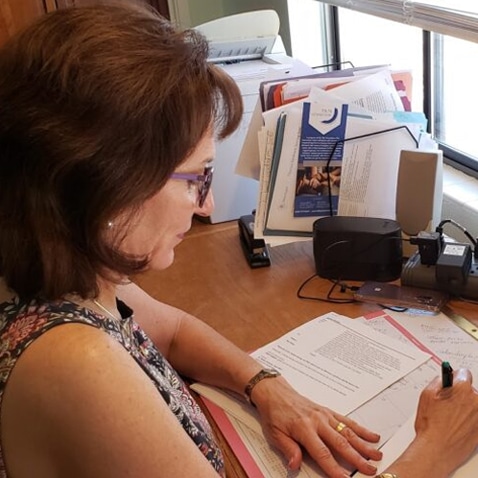While most in-person conferences and meetings have been canceled or postponed as a result of the pandemic, U.S. Pain Foundation staff were able to participate in three important virtual events recently.
 IPRCC meeting
IPRCC meeting
On June 16, Gwenn Herman, LCSW, DCSW, Clinical Director of Pain Connection, joined a videoconference meeting of the Interagency Pain Research Coordinating Committee (IPRCC), the highest-ranking permanent pain policy committee in the United States. The IPRCC heard from representatives across various federal agencies and programs.
Of particular focus was an update on the Helping End Addiction Long-term (HEAL) Initiative, a $500 million investment to support pain and addiction research at the National Institutes of Health (NIH). The HEAL Initiative has awarded 40 pain research grants since its inception in 2018 with 400 investigators. Over the course of the day, the committee heard about the HEAL Initiative’s progress to date, its research priorities, as well as challenges as a result of COVID-19.
Other major topics discussed during the day included:
- the National Institutes of Health (NIH) Pain Consortium, which recently convened its annual symposium on June 3;
- the Center for Disease Control and Prevention’s Healthy People 2030 pain objectives, which are to decrease high-impact pain for adults, increase self-management of high-impact chronic pain, and decrease high-impact pain’s effect on family members/loved ones;
- INTEGRATE-PAIN, a transatlantic United States-European cooperation in pain research between the HEAL Initiative and the Innovation in Medicine Initiative-PainCare consortium, which focused on finding predictive measures for successful treatment, pelvic pain and to identify gaps;
- Back Pain Consortium (BACPAC) Research Program, a translational, patient-centered effort that was allotted $150 million via 13 grants to address the need for effective and personalized therapies for chronic low back pain.
AACIPM symposium
 In May, the Alliance to Advance Comprehensive Integrative Pain Management (AACIPM) held an abbreviated version of its in-person Pain Policy Congress as an online symposium: “Innovation & Progress in Person-Centered Pain Management.” The two-day conference featured 45 panelists, including Cindy Steinberg, National Director of Policy and Advocacy for U.S. Pain Foundation.
In May, the Alliance to Advance Comprehensive Integrative Pain Management (AACIPM) held an abbreviated version of its in-person Pain Policy Congress as an online symposium: “Innovation & Progress in Person-Centered Pain Management.” The two-day conference featured 45 panelists, including Cindy Steinberg, National Director of Policy and Advocacy for U.S. Pain Foundation.
Steinberg spoke on a panel, “Current Updates in Pain Management,” which also included Vanila Singh, MD, MACM, Chair of the Pain Management Best Practices Task Force and a pain physician with Stanford University, and Ben Kliger, MD, MPH, the National Director for the Integrative Health Coordinating Center at the Veterans Health Administration.
AACIPM is a multistakeholder collaborative to promote comprehensive integrative pain management led by Amy Goldstein, MSW. You can learn more about the symposium and watch recordings here.
John Hopkins Pain Grand Rounds
On June 19, Steinberg was an invited speaker at the John Hopkins University School of Medicine’s Blaustein Pain Grand Rounds. Her talk was entitled, “Inadequate Pain Care in the US: The Experience, The Causes & Improvement Through Policy Change.” Steinberg spoke to approximately 40 pain researchers, professors, and clinicians for an hour.
After her talk, Peter Pitts, former Associate Food and Drug Administration Commissioner and Dr. Jennifer Haythornthwaite, a professor in the Department of Psychiatry and Behavioral Sciences, each commented on Steinberg’s presentation.
